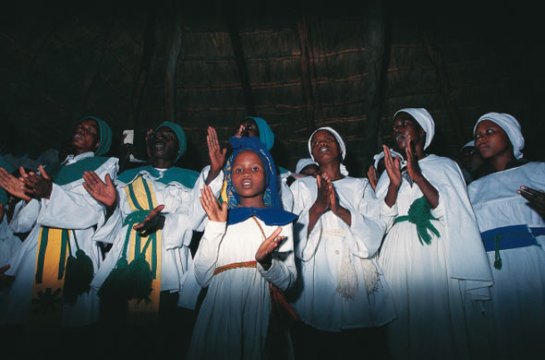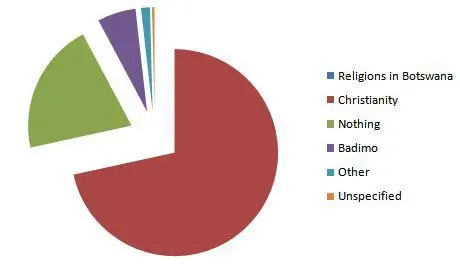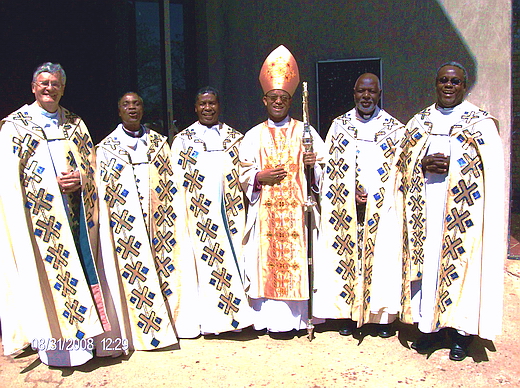 [1]
[1]
The religious makeup of Botswana is a mixture of different religions with Christianity overwhelmingly leading the pack. Over 70% of Batswana identify as Christian. Within the Christian religion, different denominations culminate to form that 70% including, but not limited to, Anglicans, Baptists, Methodists, the United Congregational Church of Southern Africa, Catholics (about 5% of the population), Jehovah Witnesses, Lutherans and Mormons. Based on data retrieved from a census conducted over a decade and a half ago, it was found that the country also features some 5,000 Muslims (less than 1% of the population), 3,000 Hindus and 700 Baha’is. Only 20% of citizens say they do not identify with a particular religion [2].
 [3]
[3]
*(Concerning religion statistics, historians note that figures concerning religion are loose estimates due to the inability to calculate attendance and membership of independent churches) [4]
Islam and Christianity have played different roles in the religious makeup of Botswana. Islam, a minority religion, came to the country by way of Muslim immigrants from South Asia [5]. Regarding Christianity, historians credit David Livingstone with being the first to introduce the gospel to Botswana [6]. In years since, Christianity has become the predominant religion in the country and the focal point of Botswana, with many different churches being birth from the countries religious resurgence. Gaborone, the capital city of Botswana, even features a Lutheran History Centre [7]. As of late, Botswana has found itself in the midst of a revival with churches committing to all-night prayer meetings. In the prayer meetings, prayers are generally focused on the leadership of the country and all the leaders in the body of Christ [8]. As Ian Michler states, “The Batswana are an extremely spiritual society and religion plays a leading role in their daily lives. [9]”
[10]
While Christianity remains the dominant religion in Botswana, many citizens continue to observe and identify with traditional African religions as well. Prior to organized religion, Batswana worshiped Modimo, who was seen as a representative of the ancestors. Interestingly enough Badimo, translated into ancestors, is the indigenous African Traditional Religion of Botswana [11], [12].
This indigenous religion believes that ancestors continue to be present and active in every day life. To Tswana people, Badimo also represent, “ghosts of deceased relatives and long-dead heroes.” Badimo’s are seen as protectors and watchers for Modimo. It is believed that if the names Badimo or Modimo are mentioned by those other than children, shamans or prophets, those individuals will turn into children, trapped in an adult body [13]. Ancestral worship in Botswana is essential to the daily lives of the people and the people believe that their ancestors are pleased when they are worshiped. Batswana who observe this African tradition believe that worshiping ancestors causes the ancestors to protect the family and keep away evil spirits. The predominant African Religion in Botswana is observed by over 65% of the population. This religion, comprised of a variety of churches, is an indigenous religion that practices a combined form of worship, combining ritualistic practices along with Christian literature. Followers of this indigenous religion are more focused on the community of worship rather than individual worship relative to modern Christianity [14].

Though diverse in regards to the different religions reflected throughout Botswana, tension among the factions, unlike some parts of Africa, are kept at bay in lieu of peaceful observance and friendly communion with one another.
Sources:
[1] “Culture and Traditions of Botswana: Religious Traditions,” Botswana.co, accessed dated: 02/03/2016, http://www.botswana.co.za/Cultural_Issues-travel/botswana-country-guide-religious-traditions.html.
[2] “Religion in Botswana,” Wikipedia, last modified: October 18, 2015, accessed date: 02/03/2016, https://en.wikipedia.org/wiki/Religion_in_Botswana.
[3] “Botswana: Want to learn more about Botswana?,” Butterflyhunter.wix.com, accessed date: 02/04/2016, http://butterflyhunter.wix.com/botswana#!__religion-pie-graph.
[4] “Botswana History Page,” Thuto.org, last modified: June 3, 2008, accessed date: 02/04/2016, http://www.thuto.org/ubh/bw/bhp11.htm.
[5] “Islam in Botswana,” Wikipedia, last modified: August 27, 2015, accessed date: 02/03/2016, https://en.wikipedia.org/wiki/Islam_in_Botswana.
[6] “Christianity in Botswana,” Wikipedia, last modified: November 17, 2014, accessed date: 02/03/2016, https://en.wikipedia.org/wiki/Christianity_in_Botswana.
[7] “Botswana,” Wikipedia, last modified: February 3, 2016, accessed date: 02/03/2016, https://en.wikipedia.org/wiki/Botswana.
[8] Wikipedia, “Christianity in Botswana.”.
[9] Botswana.co, “Culture and Traditions of Botswana: Religious Traditions.”
[10] Botswana.co, “Culture and Traditions of Botswana: Religious Traditions.”
[11] Botswana.co, “Culture and Traditions of Botswana: Religious Traditions.”
[12] “Badimo,” Wikipedia, last modified: December 24, 2015, accessed date: 02/04/2016, https://en.wikipedia.org/wiki/Badimo.
[13] “Badimo,” Godchecker.com, last modified: August 22, 2014, accessed date: 02/04/2016, http://www.godchecker.com/pantheon/african-mythology.php?deity=BADIMO.
[14] Botswana.co, “Culture and Traditions of Botswana: Religious Traditions.”
[15] “Conger: The Religious, Political and Cultural journalism of George Conger,” WordPress.com, last modified: October 24, 2008, accessed date: 02/04/2016, https://geoconger.wordpress.com/category/anglican-church-news/page/51/.


